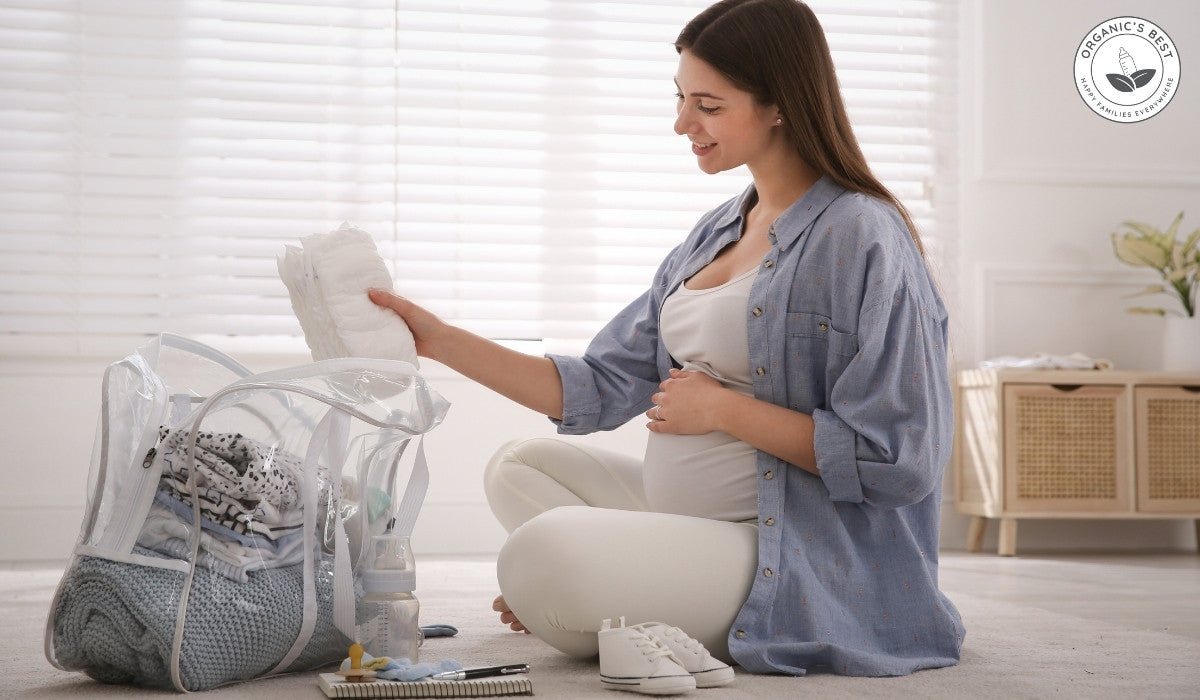Click to Get 2 FREE Boxes/Cans
Only New Customers! Click HERE to Get 2 Extra Boxes/Cans for Free With Your First Order.
BABY FORMULA
Offering new parents top-quality European infant formula from renowned brands like HiPP, Holle, Kendamil, and more. If you’re uncertain about which product to choose, our Formula Finder can help you make the best decision for your baby.
Baby Food
Offering new parents a premium selection of European baby foods, including jars, pouches, cereals, and snacks from esteemed brands like HiPP and Holle.
Hospital Bag Checklist for Mom and Baby: Essentials for a Smooth Delivery
by Agustina Fernandez March 26, 2025 8 min read

Preparing for your baby's arrival involves a lot of thoughtful planning. From setting up the nursery and selecting a name to gathering newborn essentials and creating a birth plan, there is a lot that goes into the birthing journey!
Having your hospital bag for delivery packed and ready to go can significantly reduce last-minute stress, allowing you to focus on a comfortable and supported birth experience. It's important to strike a balance, where you pack enough without overdoing it, to ensure everyone involved in the birth has what they need during those precious first days.
To help you get started, here's a comprehensive guide complete with a hospital bag checklist for birth.
Table of Contents
When to Pack Your Hospital Bag

We know that many eager moms want to have their maternity hospital bag packed and ready to go ASAP, and there's nothing wrong with getting a head start!
Being prepared can provide a sense of control and reassurance during such an exciting time. However, don't wait too long because babies don't always stick to the schedule. Sometimes little ones arrive earlier than expected, and the last thing you want is to be scrambling to pack when it's time to head to the hospital.
To stay ahead of the game, aim to have your bag packed between 35 and 38 weeks of pregnancy. If you have a high-risk pregnancy or anticipate an early delivery, it's a good idea to prepare even sooner.
Hospital Bag Essentials: What to Pack in Hospital Bag
If you're unsure where to start or need some inspiration for packing your hospital bag, we've got you covered!
Here is a complete hospital bag checklist that you can customize to fit your unique needs and situation. For example, a c-section hospital bag checklist may look different from the checklist of someone whose preparing for a vaginal birth.
Hospital Bag Checklist for Mom: Mom's Comfort and Care
Let's begin with the hospital bag for Mom. Her comfort and well-being should be the top priority. Giving birth is an intense physical and emotional experience, so having the right items on hand can help create a sense of calm and ease amidst all the excitement.

Soft Bathrobe and Socks: A soft bathrobe and cozy socks can make a world of difference, helping you relax and feel more at home by bringing a sense of comfort and familiarity to an unfamiliar environment.
Comfortable Underwear: Consider packing maternity underwear or comfortable undies that you won't mind discarding if necessary, because bleeding and lochia post-birth are not uncommon. Ideally, they should be made of a breathable material like cotton, and you'll want some postpartum pads to go with!
Nursing Bras: Nursing bras provide support and convenience if you plan to breastfeed. They are often designed with easy-access clasps or pull-down cups, which makes feeding simpler while providing the support your body needs during this transitional time.
Lip Balm and Body Lotion: Hospital environments tend to be dry, and the birthing process can be physically demanding, leaving your skin feeling dehydrated. Pack a nourishing lip balm to keep your lips soft and moisturized, especially since deep breathing and hospital air can cause dryness. A soothing body lotion can also help keep your skin comfortable, providing relief from any itchiness or tightness. Opt for a mild, fragrance-free option to avoid irritation.
Water Spray or Fan: The physical effort and hormonal changes during birth can make you feel overheated. A refreshing water spray can provide instant relief, helping to cool your face and body while keeping your skin hydrated. A handheld fan can also be a game-changer, providing a nice, steady breeze to help regulate your temperature during any intense moments.
Hair Ties or Headbands: The last thing you want is your hair sticking to your face or getting in the way. Packing a few hair ties, scrunchies, or a comfortable headband will help keep your hair secure and out of your eyes, allowing you to focus on the moment without distraction.
Toothbrush and Toothpaste: Brushing your teeth can be a small but refreshing way to feel rejuvenated after the hard work of labor and delivery. A travel-sized option is convenient, but if you prefer a full-size toothbrush, go with whatever makes you feel most comfortable.
Birth Plan: If you have specific preferences for your birth experience, bring a copy of your birth plan to share with your healthcare team.
Insurance Information: Have your insurance card and any necessary documentation readily accessible, as the hospital staff may ask for it.
Breast Pads: After giving birth, your body will start producing milk, and it's common to experience some leakage between feedings. They come in both disposable and reusable options, allowing you to choose what works best for your needs and lifestyle. Whether you're breastfeeding or pumping, having a few breast pads on hand ensures you stay dry and confident during those early days of motherhood.
Hospital Pillow: While the hospital provides pillows, there's nothing wrong with packing your own pillow. The comfort of your own pillow may help you relax and get the sleep you need after labor.
Healthy Snacks: While your doctor may ask you to avoid food before labor, it's a good idea to pack healthy snacks for after the delivery to keep your energy up. Granola bars, nuts, and dried fruit are great options that provide sustained energy.
Water Bottle: It's easy to forget to drink when you're focused on everything else, but keeping water nearby will help you stay refreshed and energized.
Baby Hospital Bag Checklist: Baby's Needs
Now that we have covered mom's hospital bag necessities, let's move on to a hospital bag checklist for baby.

Onesies: Pack a couple of onesies for your baby's first outfits. Opt for something easy to put on and take off, because we all know there will be plenty of diaper changes ahead! It's also a good idea to pack a few different sizes in case your baby surprises you with how big (or small) they are.
Going-Home Outfit: Your baby's first trip out of the hospital is a moment worth celebrating! Choose a special outfit for the big moment, something cute, easy to dress them in, and comfy enough for a newborn's delicate skin.
Swaddle Blanket: Look for a lightweight, breathable fabric to keep them cozy without overheating. Whether you're swaddling for sleep or just cuddling during feedings, a soft, warm blanket will make sure your baby stays comfortable.
Diapers: While most hospitals provide diapers, it's always nice to have your own stash so you're prepared for anything. Plus, newborns go through quite a few.
Wipes: Wipes are perfect for not just diaper changes but also quick clean-ups after feedings or any little messes.
Burp Cloths: These are great for keeping your baby clean during feedings, which means fewer outfit changes. They come in different materials like cotton, muslin, bamboo, or flannel.
Bottles: If you plan to bottle-feed, pack a couple of bottles. You can check with your hospital, as they may provide samples.
Formula: While hospitals often provide formula options, it's a good idea to do your research beforehand to choose a product that aligns with your values and preferences. Opting for a high-quality, organic formula, like those from reputable brands like HiPP or Holle, can help give your little one a healthy start in life.
Car Seat: The car seat is probably the most important item on your hospital bag checklist! Make sure you have it properly installed in your car before you head to the hospital. You won't be allowed to leave without it, so it's very important to have this ready in advance.
Hospital Bag Checklist for Dad: Birth Partner's Comfort
A birthing partner will be right by mom's side, so it's just as important to make sure that they are comfortable and prepared with a delivery hospital bag checklist. Here is a list of things to pack in hospital bag to keep them feeling ready and relaxed during the journey.

Comfortable Clothes: The birthing partner should pack a change of clothes that will keep them comfortable throughout the day (or night). Loose-fitting, breathable clothes are ideal for moving around easily and staying at ease during the long hours.
Toiletries: They will need some personal care items as well! Bring the essentials like a toothbrush, toothpaste, deodorant, and any other hygiene items they'll need to feel fresh.
Snacks and water: Hospitals may not always offer the best food options or have meals regularly, so bringing personal snacks ensures they'll have something to munch on.
Entertainment: The birthing partner should bring along something to keep themselves occupied during quieter moments, whether it's a book, tablet, or something else. It can help them pass the time and stay relaxed. But remember, the main focus is being there for Mom when she needs support. A phone charger is also a good idea, as keeping in touch with family and friends or capturing those first moments will drain the battery.
Hospital Bag List Tips

When packing your hospital bag, you may want to organize your items into separate bags or compartments to keep everything easily accessible. Have one for yourself, one for your baby, and, if needed, a small bag or section for your birth partner. This will help you stay organized and prevent unnecessary digging through a single, overstuffed bag when you need something quickly.
While bringing everything you might need is tempting, try to pack light by focusing on the essentials. Most hospitals provide many postpartum necessities, such as disposable underwear, pads, diapers, and wipes, so check with your hospital beforehand to avoid bringing duplicates.
Finally, leave some extra space in your bag for any items you may receive during your stay, such as hospital-provided baby supplies, paperwork, or even small keepsakes from the birth.
Answering Your Questions on Maternity
Here, we answer some of the most asked questions for moms prepping for their big day!
What Not to Bring to the Hospital When Having a Baby?
Avoid bringing valuables like expensive jewelry, electronics, or anything unnecessary, such as excess clothing or large amounts of food. Keep in mind that whatever you bring, you'll need to take back home, and hospitals can be busy places where items might get lost, damaged, or misplaced.
How Many Maternity Pads Do I Need After Giving Birth?
After giving birth, you'll experience heavy bleeding, known as lochia, during the first few days as your body recovers. This may include blood clots as your body adjusts to its pre-pregnancy state. Be prepared to change pads frequently, possibly every 2-4 hours initially, so pack accordingly.
How Many Newborn Outfits to Pack in Hospital Bag?
2-3 outfits should be enough to account for accidents or spills. Remember to pack age and weather-appropriate clothing.
Organic's Best Team Wishes You an Easy Delivery!
Now that you have a list of hospital bag must-haves, you can pack everything up and be all set to head to the hospital and welcome your bundle of joy into the world.
Remember to stick to the essentials, pack for comfort, and ask the hospital what they are providing ahead of time to avoid overpacking. Having your hospital bag ready to go means one less thing to worry about as your due date approaches, allowing you to focus on resting, nesting, and getting excited to meet your baby.
Wishing you a safe, joyful, and memorable delivery!
|
Disclaimer: Please be aware that this information is based on general trends in babies, and it is not medical advice. Your doctor should be your first source of information and advice when considering any changes to your child’s formula and when choosing your child’s formula. Always consult your pediatrician before making any decisions about your child’s diet or if you notice any changes in your child. Breastfeeding is the best nutrition for your baby because breast milk provides your child with all the essential nutrients they need for growth and development. Please consult your pediatrician if your child requires supplemental feeding. |
Agustina Fernandez
Dr. Agustina Fernandez earned her medical degree from the prestigious Universidad Nacional de Córdoba, Argentina. With a deep-rooted passion for pediatrics, Dr. Fernandez is currently on the path to specializing in children's healthcare. Recently, she has delved into the vital field of infant nutrition. Her research interests include breastfeeding, infant formula, and baby food in little ones’ formative years. Dr. Fernandez's commitment to this area of study underscores her dedication to ensuring the health and well-being of children from their earliest days.
Leave a comment
Comments will be approved before showing up.
Also in Organic Infant Nutrition and Health Blog

Influenza in Babies: What to Watch for Flu Symptoms in Kids
by Agustina Fernandez January 20, 2026 9 min read
Read More
Infant Botulism: Symptoms, Causes, and Safety Tips for Parents
by Agustina Fernandez January 13, 2026 8 min read
Read More
10 Winter Activities for Kids and Toddlers
by Agustina Fernandez January 06, 2026 8 min read
Read More
Reviewed by Dr. Bardha Qerimi, MD
-

Dr. Bardha Qerimi: Medical Reviewer of Organic's Best Blog
Dr. Bardha Qerimi completed her medical studies at the University of Prishtina in Kosovo, where she began her journey into the field of medicine. She has since developed a career in medical research, contributing to projects with notable organizations, including the World Health Organization (WHO).
